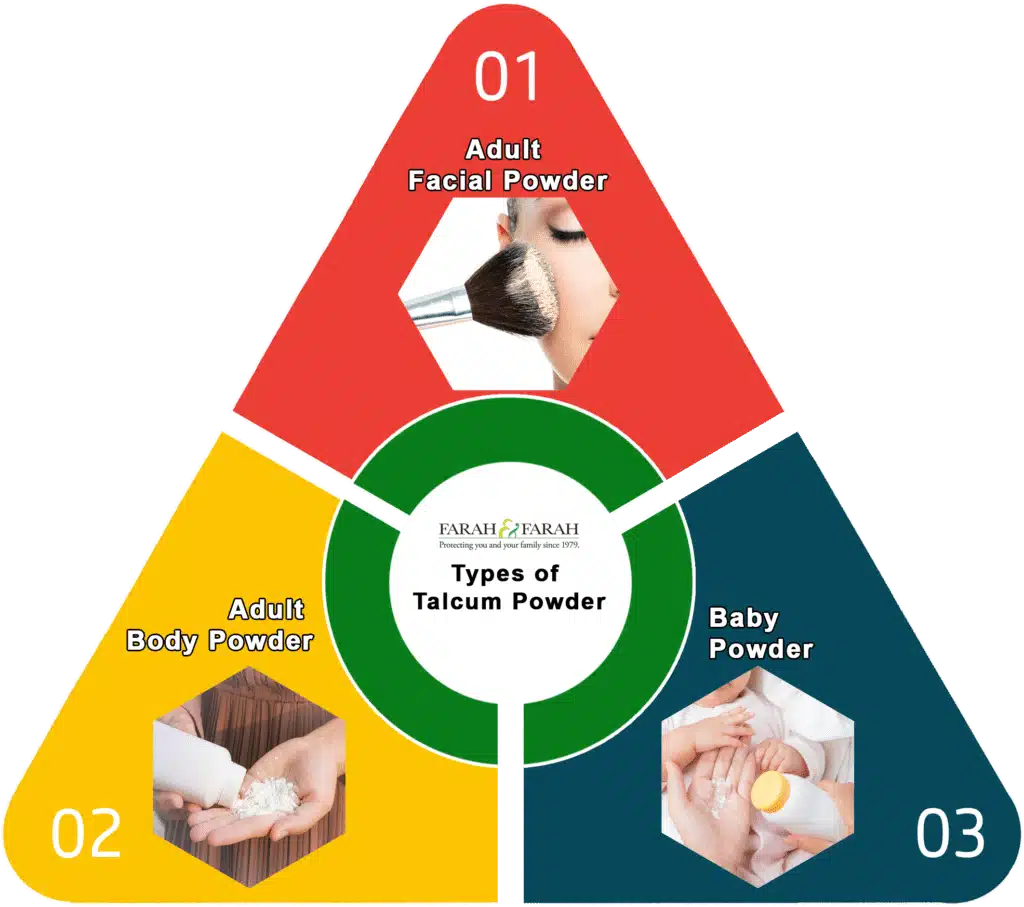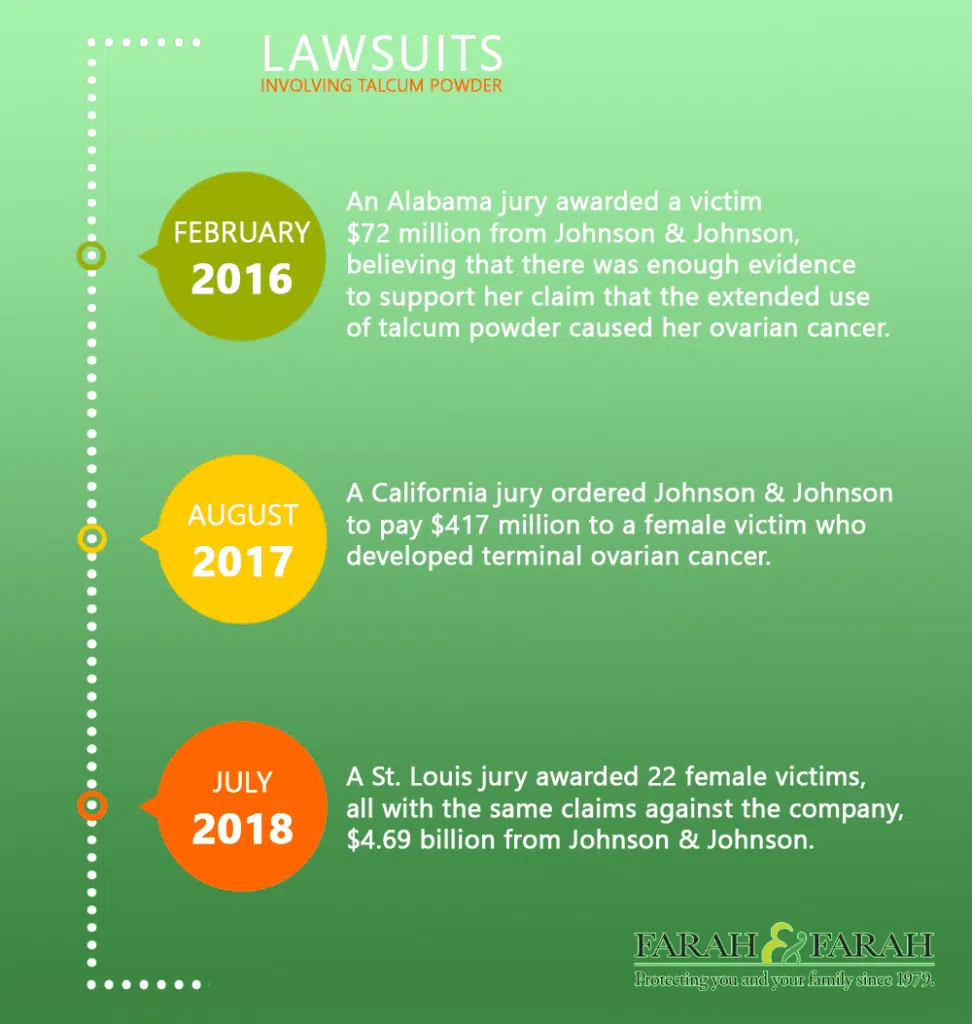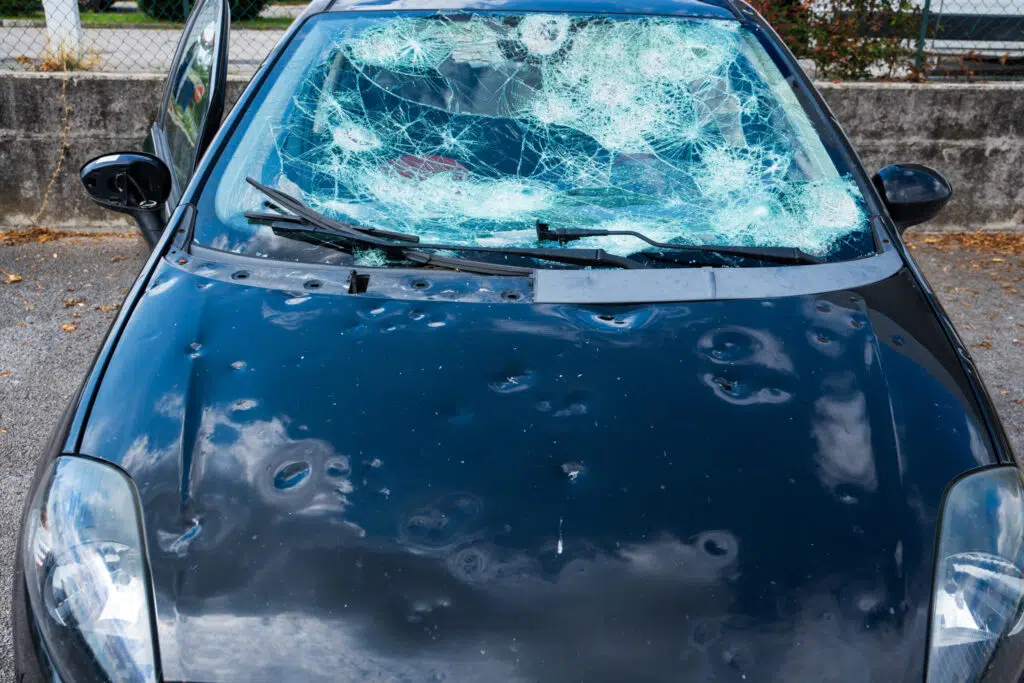Talcum Powder Cancer Lawsuit
Medical studies have shown a link between increased risk of ovarian cancer for women and the extended use of talcum powder in the pelvic region. Talcum powder manufacturer Johnson & Johnson has faced multiple lawsuits and payouts to victims, most recently in July 2018 paying $4.69 billion to 22 female victims, with over 9,400 other lawsuits pending in both state and federal courts.
Home » Product Liability Attorneys » Talcum Powder Cancer Lawsuit
Baby Formula Stomach Problems
Boar’s Head Listeria Outbreak Attorneys
Chemical Hair Straighteners Cancer Lawsuit
Dicamba Cancer Lawsuit
Ezricare Eye Drops
Paraquat Side Effects Lawsuit
Premature Baby Formula NEC Lawsuit
Product Liability Attorneys
Product Liability FAQs
Roundup Cancer Lawsuit
Ultra-Processed Foods Lawsuit
Berkeley Health of the University of California’s School of Public Health and numerous medical organizations have publicly made statements advising against the use of talcum powder due to health risks and its potential to cause cancer in women.
Hailed for its ability to treat rashes, absorb moisture, and reduce friction on human skin, talcum powder use has been linked to cancer.
Medical studies and research have gained momentum in labs, medical journals, and courts, claiming that the use of talcum powder is dangerous. Women’s use of the powder has been connected to ovarian cancer, while infant use has been linked to lung damage and the development of breathing complications.
Standing behind their statement that talcum powder is safe, manufacturer Johnson & Johnson continues to deny growing medical research and victims stating otherwise. Evidence shows the manufacturer has known of the dangers and risks associated with talcum powder since the 1980’s.
Our team at Farah & Farah believe companies should be held responsible for negligence and that victims are entitled to fair compensation for their pain and suffering.
If you or a loved one has developed cancer due to extended use of talcum powder, contact us now for a free consultation and get the justice you deserve.
What is Talcum Powder?
The main ingredient for talcum powder is talc. Talc is a soft white mineral soapstone, primarily made of magnesium silicate, silicon, and oxygen. Talcum powder is found in a variety of over-the-counter cosmetic products.
Talcum powders include:
- Adult Facial Powder
- Adult Body Powder
- Baby Powder

Talc and Asbestos
Talc in its natural state has been known to have deposits of asbestos. Asbestos, if inhaled or absorbed into the human body, has been identified by the American Cancer Society as carcinogenic, or cancer-causing.
Although asbestos is no longer used in cosmetic products or building supplies, such as drywall, exposure to asbestos still affects many today. A number of lawsuits are currently in courts with victims seeking compensation for serious health conditions caused by asbestos poisoning.
Early medical research in the 1970’s linking talcum powder to cancer initially argued that asbestos was the cancer-causing agent and not talc. According to the American Cancer Society, talc products like talcum powder sold on shelves today have been asbestos-free since the 1970’s.
But some prosecutors argue that this is not always the case. When talc is mined, it is usually in close proximity to asbestos. This leads many to believe that, despite company claims, some talcum powder products may still contain traces of asbestos, making it dangerous to the public.
Who Makes it?
Talc-based products are sold by a number of companies globally. These companies are primarily in the cosmetic and home care space. The flagship talcum powder brand is sold by Johnson & Johnson, although many other brands sell talcum-based powders.
How Does it Work?
Talcum powder is used for preventing excessive sweating in sensitive areas.
Talcum powder works by:
- Absorbing moisture
- Keeping skin dry
- Cutting down on friction
- Preventing or soothing rashes
Who Uses Talcum Powder?
Talcum powder is used by adults and infants as well as some teenagers and children.
Talcum powder is typically used by people who:
- Sweat excessively
- Develop rashes
- Are overweight
Talcum powder is generally applied:
- In the genital region for adults and infants
- In underwear
- On sanitary Napkins or diapers
- As a deodorant
What Are Risks?
The risks associated with talcum powder are its link to ovarian cancer for women and breathing complications for both infants and adults. Evidence shows that manufacturers of talcum powder have known of these risks since as early as the 1980’s.
When cases began to surface linking talc to ovarian cancer development in the 1970’s, medical studies concluded prolonged application of talcum powder in the genital region was the cause. But due to the presence of asbestos, manufacturers and other organization wrote off the dangers of talc. Already a known carcinogen to cause cancer, asbestos was removed from talcum powder. Health organizations and manufacturers asserted that the cancer-causing ingredient was asbestos, not talc.
But growing medical evidence and court rulings favoring victims have raised concerns regarding the risks of using Talcum Powder.

Who Is Most At Risk Using Talcum Powder?
Talcum powder presents the greatest risk to infants and women. The American Academy of Pediatrics advises against using talcum powder with infants for health risks that are different from those for women.
For women:
- Risk of developing ovarian cancer
- Believed to be caused by extended application of talcum powder in genital region
For Infants:
- Risk of severe lung damage or developing breathing problems
- Occurs when Talcum powder is inhaled accidentally
Considerations if Using Talcum Powder
Berkeley Wellness, with the University of California’s School of Public Health, along with many other organizations, advise against the use of talcum powder.
Cautions to take for women using talcum powder include:
- Limit to occasional use
- Use in well-ventilated rooms
- Reduce the amount applied
- Women should not use in their genital area
Cautions for use on infants:
- Apply in a well-ventilated room
- Always keep away from the baby’s face
- Carefully pour out a small amount, far from where the baby can inhale it
Alternatives to Talcum Powder
There are a number of alternatives to talcum powder that are more natural and that present many fewer health risks for users. Compared to powders with larger microfibers, such as those that are cornstarch-based, talcum powder is easier for toddlers to inhale because of its small microfibers.
Alternatives to talcum powder include:
- Arrowroot starch – derived from tropical plants in South America and an all-natural alternative found in any paleo grocery store or kitchen
- Baking Soda – a baby powder alternative also used as a deodorant
- Cornstarch – a natural alternative to talc found in the baking aisle of any grocery store
- Oat flour – the rawer/coarser powder alternative of the available alternatives
- Tapioca starch – derived from the crushed-up pulp of a woody shrub from South America called the cassava plant and an all-natural alternative found in any paleo grocery store or kitchen
More commercial alternative baby powders include natural baby powders and deodorants produced by:
- Nature’s Baby Organics
- Burt’s Bees Baby
- The Honest Company
- Honeybee Gardens
For mothers wanting a safe option, baby powder alternatives can be made at home using the natural ingredients listed above. Recipes can be found on sites such as Wellness Mama.
Talcum & Ovarian Cancer
In the United States Ovarian cancer causes over 14,000 deaths each year. Epidemiological research looking into the connection between health, products, and disease has found some links between asbestos-free talc products and cancer. Medical research remains mixed, but studies conclude that increased inflammation in the area caused by talc is what leads to the development of ovarian cancer.
Lawsuits Involving Talcum Powder
Lawsuits involving talcum powder date began in 2016. To date, there have been more than 6,600 baby powder lawsuits filed against Johnson & Johnson and over 9,400 lawsuits currently pending in state and local courts.
Some of the major lawsuits involving talcum powder include:
- February 2016 – An Alabama jury awarded a victim $72 million from Johnson & Johnson, believing that there was enough evidence to support her claim that the extended use of talcum powder caused her ovarian cancer.
- August 2017 – A California jury ordered Johnson & Johnson to pay $417 million to a female victim who developed terminal ovarian cancer.
- July 2018 – A St. Louis jury awarded 22 female victims, all with the same claims against the company, $4.69 billion from Johnson & Johnson.
Some cases have been overturned in favor of Johnson & Johnson either in appeals or superior courts. A May 2016 Missouri ruling awarding a victim $55 million, was overturned in June in a Missouri appeals court, citing jurisdictional issues.

Talcum Powder & Regulatory Agencies – FDA & WHO
The US Food and Drug Administration (FDA) does not require as strict a review of cosmetic products as it does for drugs or medical devices. The FDA stance on talcum powder is to monitor its potential health effects. The FDA regulatory focus with talc products has primarily been to ensure cosmetic talc products are asbestos-free, rather than probing further into its link with ovarian cancer.
The International Agency for Cancer Research under the World Health Organization classified the use of talc products in the genital area as “possibly carcinogenic to humans” in 2006.
Medical Studies & Research
Talcum powders and its connection to ovarian cancer development has been the subject of many medical studies resulting in mixed conclusions.
- Nov 2011 – A study by the International Journal of Cancer conducted in the Central Valley of California region found supporting evidence that the application of talc products in the genital region increases the risk of developing ovarian cancer.
- Sept 2014 – The Journal of the National Cancer Institute found the opposite, stating that applying talc powder in the genital region “did not appear to influence ovarian cancer risk.”
- Jan 2008 – A study conducted by the Australian Ovarian Cancer Study Group argued that there was sufficient evidence linking talc application in the genital region to ovarian cancer, identifying inflammation caused by talc as the primary cause.
- Mar 2009 – A study published in the International Journal of Cancer conducted in Los Angeles County found that “women who were talc users and had a history of endometriosis showed a 3-fold increased risk of ovarian cancer associated with talc use.”
- May 2016 – A study published in the Journal of Epidemiology found “risks for ovarian cancer from genital talc use vary by histologic subtype, menopausal status at diagnosis, Hormone Therapy use, weight, and smoking.”
Further research is still being conducted to establish a more direct link.
How Can I Determine if I Have a Case for a Talcum Powder Lawsuit?
If you or a loved one has developed one of the qualifying cancers below due to the use of talcum powder in the pelvic area, you may have a case and be entitled to compensation:
Ovarian Cancer
Fallopian Tube Cancer
Peritoneal Cancer
Uterine Cancer
Endometrial Cancer

There are already a number of class action lawsuits already taking place against the manufacturers of talcum powder, especially Johnson & Johnson. Speak with our highly experienced and caring team, which specializes in complex medical litigation. Our team at Farah & Farah fights for justice for our clients and offers a free consultation to assess your case, with no cost to you unless your case wins.
Contact us now to get your case reviewed at no cost you.
Co-counsel will be associated on these cases.

free case review
Related Pages
Client Testimonials

Related Blogs













